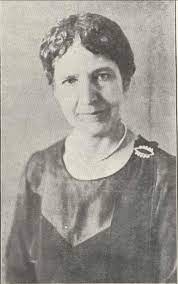An American educator and relief worker, Bertha B. Morley headed schools and orphanages in the Ottoman Empire and rescued children from the Armenian Genocide, writing down journals that became an important eyewitness account.
Bertha Morley was born on June 21, 1878, in Mentor, Ohio. She attended Oberlin College (1895–1898) but did not complete her studies due to poor health. From 1898 to 1900, she attended Lake Erie Conservatory of Music and joined the New England Conservatory of Music in Boston (1904). She was appointed teacher at the American Missionary Association boarding school (Pleasant Hill, Tennessee) from 1905 to 1910.
She traveled to Marsovan (Merzifon), Turkey, in 1911, to visit her sister Lucy Harriet Morley Marden and her brother–in-law Jesse Krekore Marden, who headed the local American missionary hospital under the direction of the American Board of Commissioners for Foreign Missions (ABCFM). She became interested in the work of the mission there and taught at the American school in the district of Gedik Pasa (Constantinople) from 1911 to 1913.
From 1913 to 1916, she joined the ABCFM Western Turkey Mission and taught music, geometry, and history at the Anatolia Girls’ School in Marsovan. During this period, she became a witness to the initial phase of the Armenian Genocide and kept a daily journal of what she saw. In her diary, Morley described the escalation of the Genocide as she saw it over the course of 1915: the destruction of the Marsovan Armenian community, the plunder of Armenian property, and the forced conversion of Armenian women and children. She also attested to the efforts of Ottoman authorities to conceal their criminal activities.
The missionary institutions in Marsovan were suddenly closed by the Ottoman government in 1916 and Morley was forced to return to the United States. Upon her return, she took refresher courses from the Hartford Seminary and afterwards, she attended the Oberlin Conservatory of Music (1916-1917). From 1918 to 1919, she went with the American Red Cross to do refugee work. For nine months she was assigned to Antoura, now in Lebanon, where she worked as the principal of an orphanage of 630 children, most of whom were Armenian, and adopted eleven Armenian children.
The Marsovan missionary institutions were reopened after the Ottoman defeat in World War I, and Morley and her children returned there, becoming head of the Anatolia Girls’ School. However, the Turkish government closed again Anatolia College in March 1921 and Morley moved with her children to Smyrna. She was a witness of the burning of Smyrna in September 1922 at the end of the Greek–Turkish war and attested in her letters to the atrocities committed against Greeks and Armenians. She rescued many children from the orphanage for Armenian girls at the American Collegiate Institute in Smyrna and led the children to escape in an American merchant ship to Piraeus, near Athens.
Morley taught at the American Girls’ School in Salonica (Thessaloniki) until June 1923. The Marsovan Girls’ School reopened yet again in 1924 and she returned there for a year, until she went back to the United due to poor health in January 1925. She enrolled several of her children in school and completed a B.A. from Lake Erie College in 1929.
In 1929, Morley returned to Anatolia College, which reopened in Salonica, and became principal of the Girls’ School. She served until the invasion of Greece by Germany in World War II, at which point she returned to the United States (1941). In 1945 she was granted the status of Missionary Emeritus by the ABCFM. She moved to California in 1949 to help care for her ailing sister and died on March 22, 1973, in Claremont, California. Her diaries were first published by the Gomidas Institute in 2000.

